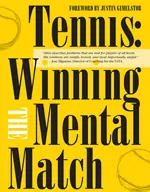Because tennis is a one-to-one struggle of wills, it has the penchant for becoming personally antagonistic. How might this enter into an afternoon's healthy exercise on the court?
Picture the following scenario: Your game with Mike, the local hotshot at your club, starts out as a friendly, social match. It's a nice day and you are hitting the ball well. On the other hand so is he, and the games are close.
Tennis Events Near You
More: 3 Ways to Mentally Dominate Your Opponent
As the set progresses, your mutual investment in it increases, and you both step up your efforts to win. Gradually, the gloves come off, and you are now determined to prevail. Yet you feel emotionally amiss.
More and more, Mike has begun to irritate you, and it's affecting your game. They way he swaggers after making a good shot grates on your nerves. His calls are a little too quick and there is a smug, pleased tone to his voice as he yells, "Out." With an attitude like that you can be sure that he will give himself the benefit of the doubt on close calls.
Yes, the more you think of it, the man obviously has no sense of morality or decency and is sure to take unfair advantage every chance he gets. You recoil at the thought of having to smile and shake his hand if he beats you. In fact, it has now become a moral imperative for you to win.
More: How to Avoid the Trap of Making Excuses
The match has become personal, and, as it usually does when this happens, you will not be playing well. Strongly disliking your opponent raises the stakes in the match and you start wanting to win too much. It diverts your thoughts and emotions away from productive, practical ones and on to issues of winning and losing or getting the better of your opponent.
Simply, you start thinking too much and your emotions get out of control. If you feel yourself slipping in this direction (and you too often will in this antagonistic game of ours), how can you counter it?
Forewarned is forearmed. Since tennis is, by its nature, a symbolic fist fight, heated competition is likely to call forth our genetically programmed aggression responses. (Early advocates of the sport recognized this and instituted a rigid set of sportsmanship protocols to keep our ugly fighting instincts at bay. The old boys knew what they were doing. Observing courtesies cools aggression.)
More: How Champions React to Failure
The best way to side-step antagonism is to make up your mind beforehand that you will not allow yourself to have such feelings. Recognize that if you let nature take its course, you will, at times, become antagonistic. If, however, you consciously resolve beforehand to avoid this seductive trap, you won't.




